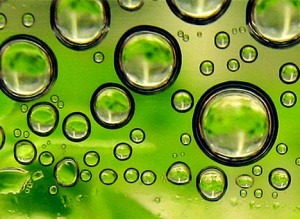Genetic Engineering – By: Dr. John Kyndt ( Head Scientist of the Renewable Energy Program at Advanced Energy Creations Lab) and Dr. Aecio D’Silva.

Green algae possess several unique features that are important for biofuel production. For example the ability to accumulate large amounts of TAGs (triacylglycerol lipids) for biodiesel production or hydrocarbons for biojetfuel. Other species are able to produce ample storage starch that can be used for bioethanol production.
The problem we are facing is that the algal species that are growing very fast and produce a lot of biomass are not the species that produce most the lipids or starch. Species from all over the world are being screened to find high oil or sugar production. It is however very unlikely that one algal species will have all the characteristics required for biofuel production.
One approach is to increase a certain species ability to produce more lipids or sugars by using genetic engineering (GE). In simple terms, GE is the introduction of DNA from one organism into another organism to enhance certain features of the host organism.
For example, in theory we are able to take genes from algal species that produce a lot of lipids and engineer them into a fast growing algal species and get ‘the best of both worlds’.
Genetic Engineering of Green Algae – Challenges We are Facing
Two challenges that researchers face are 1) finding which genes that need to be transferred, and 2) developing the tools to modify a certain algal species.
As the interest in the algae for biofuels topic has grown exponentially in the last couple of years, significant progress is being made to overcome these challenges. Many improvements have been realized, includingincreased lipid and carbohydrate production, improved H2 yields,and the diversion of metabolic intermediates into fungiblebiofuels.
However, genetically modified algae (or GMO algae) are still confined to a handful private sector labs and a few academic institutions and a widely distributed superior GMO algae is likely to be a while away.
On a research and development scale, genetic approaches can aid in understanding the regulation of algal lipid metabolism and carbon partitioning under different growth conditions. Lessons learn from that will aid in modifying the accumulation of lipids, alcohols,hydrocarbons, sugars, and other energy storage compounds, which in the end will be crucial to render the algae for biofuel concept economically viable.
Even when a species is created that has increased biofuel features there are potential drawbacks on genetic engineering of algae. It is expected to weaken its ecological fitness. When used in scaled up systems it is critical that the GE organism is kept healthy and dominant.
By clever engineering we can design species that only have the advantage under a controlled system. This approach is a similar to the use of E. coli, which is a natural human intestinal bacterium that is now widely used for research and commercial industrial applications.
This is the reason why in our research we try to focus on non-GMO technologies for manipulating algae and at the same time design attenuated algae that cannot grow outside a cultivated environment.
As mentioned in our blog earlier there are definitely challenges beyond the technical hurdles (Algae GMO’s: The Next Big Challenge in Algae for Biofuels?) . In the long run, a lot of regulatory and political challenges will arise with the use of GMO algae on a larger commercial scale.
It is therefore important to use the genetic tools described above to engineer the selected algae in such a manner that the competitive advantage of the new species is maintained under controlled conditions.
Every day we and other researchers are getting closer to unraveling the details of these algal systems and are developing engineering strategies. In the end, a combination of innovative genetic engineering and non-GMO technologies will be necessary to take algae for biofuels to the next level.
Related Links:
- Genetic Engineering: A Brief Overview
- Algae GMO’s: The Next Big Challenge in Algae for Biofuels?
- Engenharia Genética Revolucionado o Mundo que Vivemos



[…] Genetic Engineering: The Potential of Green Algae […]
[…] of industrial use for genetically engineered organisms. We have recently posted articles on the history of genetic engineering and using GE for algal biofuel production. However the list of ongoing experiments and development of novel GMO’s is growing […]
[…] Genetic Engineering: The Potential of Green Algae […]